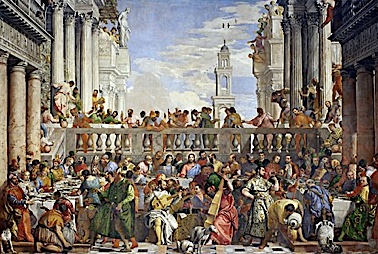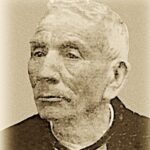Image: Nazareth as depicted on a Byzantine mosaic by Meister der Kahriye-Cami-Kirche in Istanbul (1315-1320)
Pope Francis’ Angelus Reflection (based on Gospel Reading Sunday
St Peter’s Square – 19th January2025
Gospel Reading (John 2:1-11)
There was a wedding at Cana in Galilee. The mother of Jesus was there, and Jesus and his disciples had also been invited. When they ran out of wine, since the wine provided for the wedding was all finished, the mother of Jesus said to him, ‘They have no wine.’ Jesus said ‘Woman, why turn to me? My hour has not come yet.’ His mother said to the servants, ‘Do whatever he tells you.’ There were six stone water jars standing there, meant for the ablutions that are customary among the Jews: each could hold twenty or thirty gallons.
Jesus said to the servants, ‘Fill the jars with water’, and they filled them to the brim. ‘Draw some out now’ he told them ‘and take it to the steward.’ They did this; the steward tasted the water, and it had turned into wine.
Having no idea where it came from – only the servants who had drawn the water knew – the steward called the bridegroom and said, ‘People generally serve the best wine first, and keep the cheaper sort till the guests have had plenty to drink; but you have kept the best wine till now.’
This was the first of the signs given by Jesus: it was given at Cana in Galilee. He let his glory be seen, and his disciples believed in him.
Pope Francis’ Homily 2025
Dear Brothers and Sisters,
The Gospel of today’s liturgy tells us of Jesus’ first sign, when he turns water into wine during a wedding feast at Cana in Galilee.
It is a story that anticipates and summarizes the whole mission of Jesus: on the day of the coming of the Messiah – so the prophets said – the Lord will prepare “a banquet of excellent wines” (Is 25:6) and “the mountains will pour out the new wine” (Am 9:13); Jesus is the Bridegroom who brings the “new wine”.
In this Gospel we can find two things: lack and superabundance.
On the one hand, the wine is lacking and Mary says to her Son: “They have no wine” (v. 3).
On the other hand, Jesus intervenes by having six large amphorae jars filled and, in the end, the wine is so abundant and exquisite that the master of the banquet asks the bridegroom why he kept it until the end (v. 10).
Thus, our sign is always lack, but always “the sign of God is superabundance” and the superabundance of Cana is the sign of this.
How does God respond to human’s lack?
With superabundance (cf. Rom 5:20 – where sin increased, grace abounded all the more).
God is not stingy! When he gives, he gives a lot. It doesn’t give you a little bit, it gives you a lot.
The Lord responds to our shortcomings with his superabundance.
In the banquet of our lives – sometimes we can say – ‘the wine is lacking’: ‘we lack strength and many things’. This happens when the worries of life afflict us, when the fears that assail us or the disruptive forces of evil rob us of the taste for life. of the intoxication of joy and of hope.
Let us be careful: in the face of this lack. When the Lord gives, he gives superabundance.
It seems a contradiction: the more there is lack in us, the more there is superabundance from the Lord. The Lord wants to celebrate with us, a feast that will have no end.
Let us then pray to the Virgin Mary. May she, who is the “Woman of the new wine”, intercede for us and, in this Jubilee Year, help us to rediscover the joy of the encounter with Jesus.


